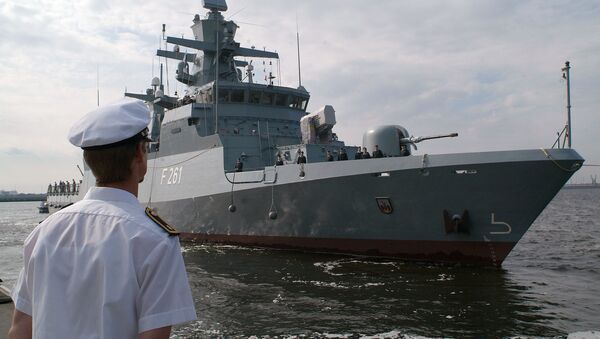Germany's ruling coalition includes representatives of the center-right Cristian Democratic Union party (CDU), the conservative Christian Social Union party (CSU) and the Social Democratic Party (SPD).
"To cope with the new security challenges in the Baltic region, the Mediterranean and in the world as a whole, the coalition of the CDU/CSU alliance and the SPD plans to purchase five new corvettes for the German navy worth 1.5 billion euros," the newspaper quoted the sources as saying.
The first two ships are expected to be put into service in 2019, while the other three vessels are due to become part of the German navy by 2023.
Right now, the country's navy has a total of five K 130 Braunschweig-class corvettes, according to Suddeutsche Zeitung.
Technical datasheet: K130 Braunschweig Class #Corvette — German Navy http://t.co/CbwoX5RYDS pic.twitter.com/5SGYnuOO12
— NavyRecognition (@NavyRecognition) 31 марта 2015 г.
These newest class of Germans corvettes is mainly used in coastal waters, including in the Baltic Sea, the newspaper said.
Braunschweig class corvette (F260 Braunschweig) #BirdsEyeView https://t.co/1bhCDMJPYe pic.twitter.com/J1FXt8gWYq
— VirtualGlobetrotting (@VirtualGlobe) 23 апреля 2016 г.
In this connection, Suddeutsche Zeitung suggested that the German navy's modernization, such as the current purchase of five Braunschweig class corvettes, could be perceived as Berlin's signal to Russia.
Earlier this week, Russian Deputy Defense Minister Nikolay Pankov said that Moscow will establish a permanent naval base in the Syrian port city of Tartus, home to a Russian Navy maintenance and support facility which was established by the Soviet Union in 1977.
Pankov also said that the Russian Defense Ministry was looking into reestablishing Russian bases in Cuba and Vietnam.
In addition, media reports cited Russia's plans to return to a former Soviet air force base in the Egyptian city of Sidi Barrani.




